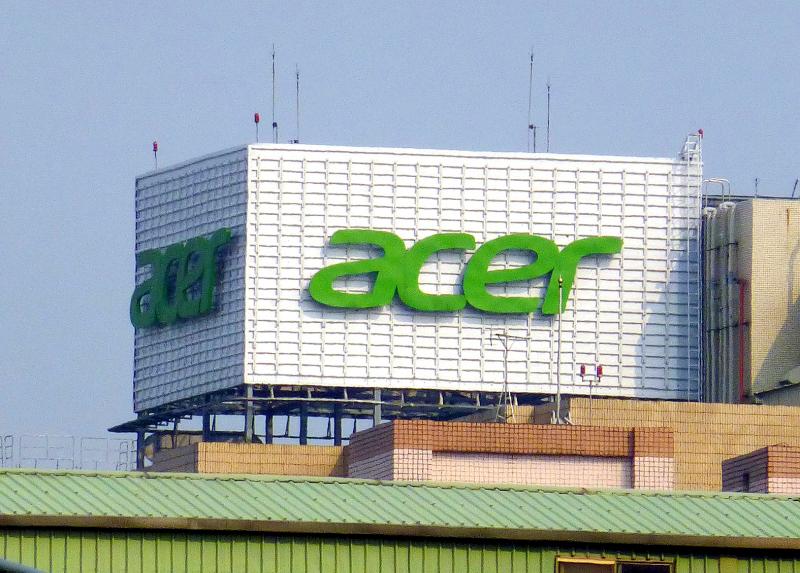Acer Inc (宏碁) remained the world’s fifth-largest PC brand last year, with shipments increasing 23 percent from a year earlier, International Data Corp (IDC) data showed.
The global PC market received a significant boost from the booming stay-at-home economy amid the COVID-19 pandemic, and Acer was among the biggest beneficiaries of online learning and remote working, IDC said in a report on Monday last week.
Acer shipped 20.99 million PCs, up 22.9 percent from 2019, and took a 6.9 percent share of the global market, the report said.

Photo: David Chang, EPA-EFE
Worldwide, PC shipments last year totaled 302.61 million units, up 13.1 percent annually, it said.
“Demand is pushing the PC market forward and all signs indicate this surge still has a way to go,” Ryan Reith, vice president of IDC’s Worldwide Mobile Device Trackers program, said in a statement. “The obvious drivers for last year’s growth centered around work from home and remote learning needs, but the strength of the consumer market should not be overlooked.”
“We continue to see gaming PCs and monitor sales at all-time highs and Chrome-based devices are expanding beyond education into the consumer market. In retrospect, the pandemic not only fueled PC market demand but also created opportunities that resulted in a market expansion,” Reith said.
Lenovo Group Ltd (聯想) took the top spot last year with a 24 percent market share after shipping 72.67 million PCs, up 12 percent from a year earlier, IDC said.
HP Inc came in second with a 22.4 percent market share, after its shipments rose 7.5 percent to 67.65 million PCs, while Dell Inc saw its shipments rise 8.1 percent to 50.30 million units, giving it a 16.6 percent share.
No. 4, Apple Inc, finished last year with a 7.6 percent share on shipments of 23.10 million PCs. Among the top five, the company posted the fastest growth in shipments for the year at 29.1 percent, IDC said.
In the fourth quarter alone, global PC shipments rose 26.1 percent year-on-year to 91.60 million units, the report said.
Lenovo led the industry with a 25.2 percent share during the quarter, followed by HP’s 20.9 percent, Dell’s 17.2 percent, Apple’s 8 percent and Acer’s 7.2 percent.
Apple and Acer saw their shipments in the fourth quarter rise 49.2 percent and 48.3 percent year-on-year respectively, the report said.

SEMICONDUCTORS: The firm has already completed one fab, which is to begin mass producing 2-nanomater chips next year, while two others are under construction Taiwan Semiconductor Manufacturing Co (TSMC, 台積電), the world’s largest contract chipmaker, plans to begin construction of its fourth and fifth wafer fabs in Kaohsiung next year, targeting the development of high-end processes. The two facilities — P4 and P5 — are part of TSMC’s production expansion program, which aims to build five fabs in Kaohsiung. TSMC facility division vice president Arthur Chuang (莊子壽) on Thursday said that the five facilities are expected to create 8,000 jobs. To respond to the fast-changing global semiconductor industry and escalating international competition, TSMC said it has to keep growing by expanding its production footprints. The P4 and P5

DOWNFALL: The Singapore-based oil magnate Lim Oon Kuin was accused of hiding US$800 million in losses and leaving 20 banks with substantial liabilities Former tycoon Lim Oon Kuin (林恩強) has been declared bankrupt in Singapore, following the collapse of his oil trading empire. The name of the founder of Hin Leong Trading Pte Ltd (興隆貿易) and his children Lim Huey Ching (林慧清) and Lim Chee Meng (林志朋) were listed as having been issued a bankruptcy order on Dec. 19, the government gazette showed. The younger Lims were directors at the company. Leow Quek Shiong and Seah Roh Lin of BDO Advisory Pte Ltd are the trustees, according to the gazette. At its peak, Hin Leong traded a range of oil products, made lubricants and operated loading

The growing popularity of Chinese sport utility vehicles and pickup trucks has shaken up Mexico’s luxury car market, hitting sales of traditionally dominant brands such as Mercedes-Benz and BMW. Mexicans are increasingly switching from traditionally dominant sedans to Chinese vehicles due to a combination of comfort, technology and price, industry experts say. It is no small feat in a country home to factories of foreign brands such as Audi and BMW, and where until a few years ago imported Chinese cars were stigmatized, as in other parts of the world. The high-end segment of the market registered a sales drop

Citigroup Inc and Bank of America Corp said they are leaving a global climate-banking group, becoming the latest Wall Street lenders to exit the coalition in the past month. In a statement, Citigroup said while it remains committed to achieving net zero emissions, it is exiting the Net-Zero Banking Alliance (NZBA). Bank of America said separately on Tuesday that it is also leaving NZBA, adding that it would continue to work with clients on reducing greenhouse gas emissions. The banks’ departure from NZBA follows Goldman Sachs Group Inc and Wells Fargo & Co. The largest US financial institutions are under increasing pressure